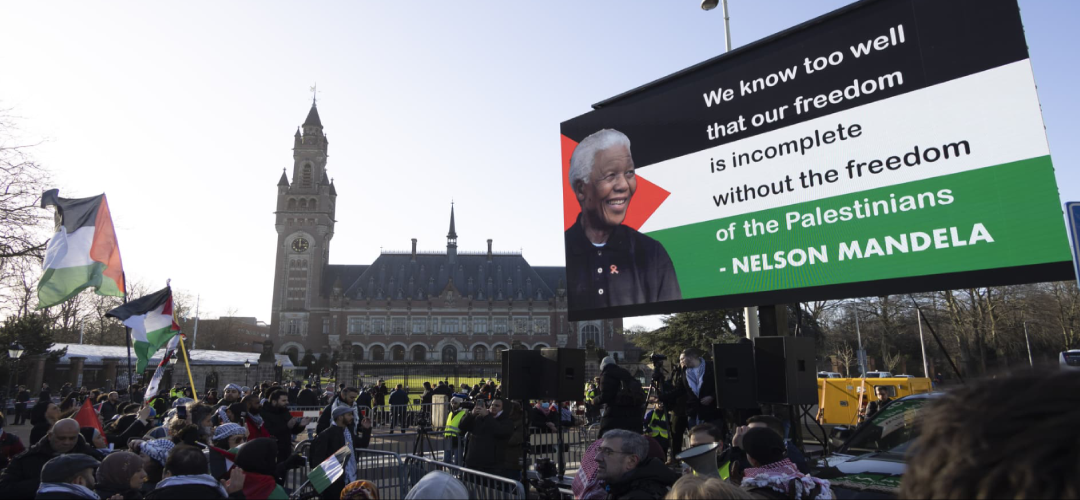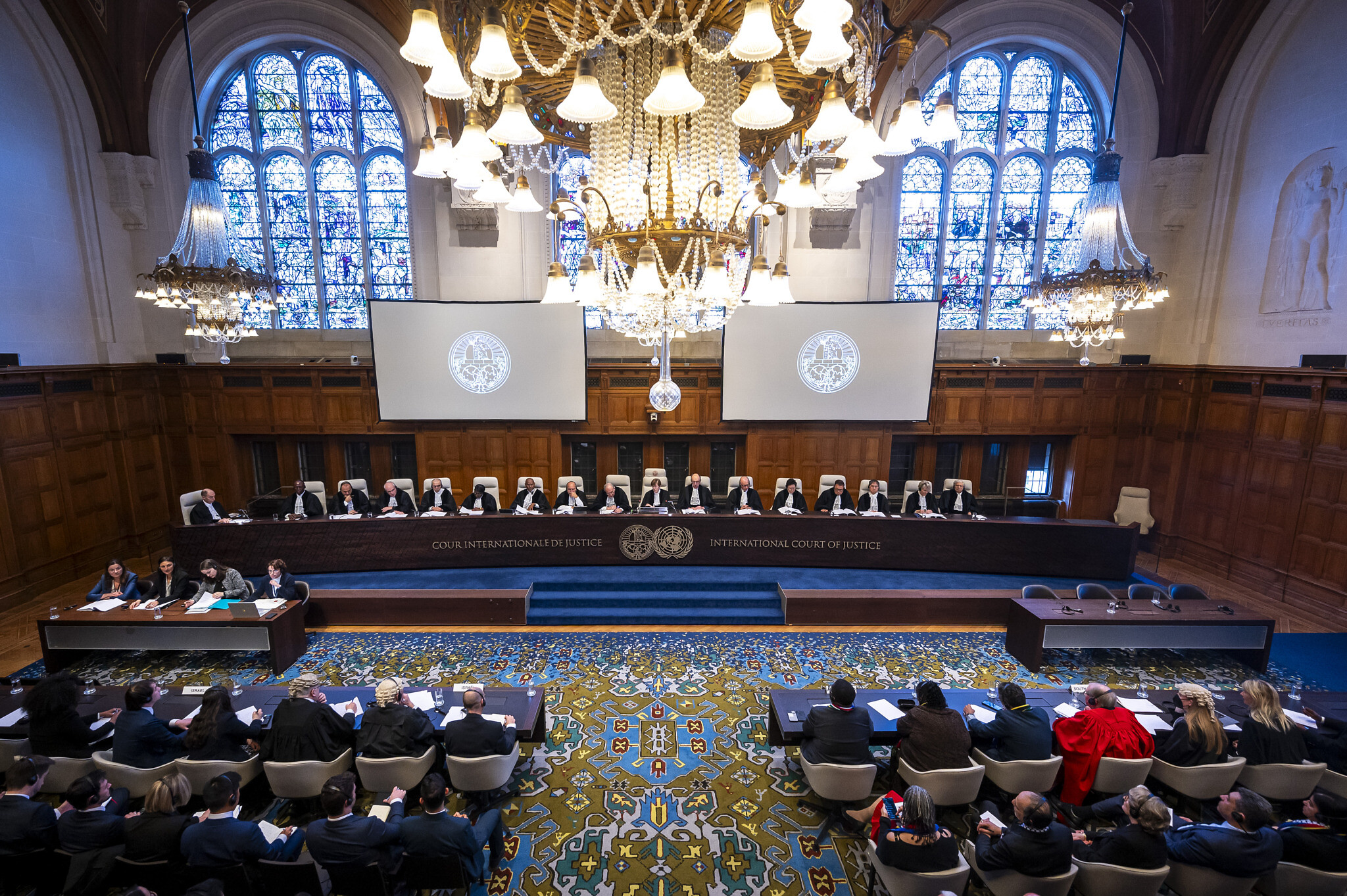ICJ Orders Israel to Prevent Acts of Genocide: An Explainer
February 4, 2024 | Expert Insights

On January 26, 2024, the International Court of Justice (ICJ) issued a landmark interim order in the case brought by South Africa against Israel, accusing the latter of violating the Genocide Convention in its actions towards Palestinians in Gaza. While the Court stopped short of calling for an immediate ceasefire, it imposed several significant measures on Israel and highlighted the gravity of the situation.
Background
In October 2023, a surge in violence between Israel and Hamas ignited a legal battle with far-reaching implications. South Africa accuses Israel of committing genocide against Palestinians in Gaza during the conflict. They allege that Israel's military operations specifically targeted Palestinians based on their ethnicity and religion, fulfilling the definition of genocide enshrined in international law.
Several key points bolster South Africa's claim. Firstly, a disproportionately high number of civilians, predominantly Palestinians, lost their lives in the conflict. This, South Africa argues, is evidence of indiscriminate targeting, a hallmark of genocide. Secondly, the widespread destruction of homes, hospitals, and essential infrastructure in Gaza suggests a deliberate attempt to cripple Palestinian society. This aligns with the definition of genocide that includes "imposing conditions of life calculated to bring about physical destruction in whole or in part." Finally, South Africa cites inflammatory statements by Israeli officials, allegedly dehumanizing Palestinians and advocating harsh measures, as proof of genocidal intent. Such rhetoric, they argue, fuels the necessary mental state for committing genocide.
However, the situation is far from clear-cut. Israel vehemently denies any genocidal intent, claiming their actions solely targeted Hamas, a militant group responsible for attacking Israeli civilians. They argue that Palestinian civilian casualties were regrettable but unavoidable collateral damage, a tragic consequence of the conflict's nature. Additionally, both sides present evidence supporting their respective narratives, making it difficult to definitively establish if Israeli actions deliberately targeted civilians or solely resulted from the inherent chaos of armed conflict. Furthermore, legal hurdles await before the International Court of Justice (ICJ) can deliver a final verdict. Key questions remain regarding the court's jurisdiction in this case and whether the evidence sufficiently demonstrates genocidal intent on Israel's part.
The International Court of Justice (ICJ) issued a landmark interim order in the case brought by South Africa against Israel, accusing the latter of violating the Genocide Convention in its actions towards Palestinians in Gaza. While the order doesn't definitively rule on whether genocide occurred, it sets forth crucial provisional measures binding Israel and carries significant implications for the ongoing conflict.
The order mandates Israel to uphold its obligations under the Genocide Convention by preventing acts like killings, inflicting severe harm, and creating conditions leading to the physical destruction of the Palestinian group. This emphasizes Israel's responsibility to conduct its military operations within the bounds of international law and refrain from actions that could constitute genocide.
The order specifically targets incitement to genocide by requiring Israel to prevent and punish such behaviour. These address accusations of inflammatory remarks made by Israeli officials, which South Africa argues demonstrates genocidal intent. By demanding measures against such rhetoric, the ICJ aims to curb its potential contribution to inciting violence and fostering conditions for genocide.
The order prioritizes the dire humanitarian situation in Gaza by demanding immediate and effective humanitarian aid. This acknowledges the suffering inflicted on the civilian population and underscores the need for urgent action to alleviate their hardships. Additionally, requiring Israel to report on measures taken to comply with the order within a month ensures a degree of transparency and accountability in its actions.

Analysis
While South Africa requested an immediate ceasefire, the order doesn't explicitly address this issue, leaving the ongoing hostilities unresolved for now. This highlights the complexity of the situation and the limitations of the ICJ's mandate, which primarily focuses on legal violations rather than immediate political solutions.
It's crucial to recognize the order's limited scope. It doesn't delve into past actions or address potential war crimes allegations. Additionally, the ICJ lacks its own enforcement power, relying on international pressure and reputational consequences to ensure compliance. This raises concerns about the effectiveness of the order in achieving its intended goals.
Israel contests the ICJ's jurisdiction in this case, potentially leading to further legal challenges that could delay or even derail the proceedings. Despite these limitations, the order's symbolic weight and potential influence on international public opinion and future legal actions cannot be underestimated. It serves as a significant step in holding Israel accountable.
The International Court of Justice (ICJ) has a history of grappling with complex allegations of genocide, offering insights into the current legal battle between South Africa and Israel. In 1993, Bosnia-Herzegovina brought a case against Yugoslavia for atrocities committed against its Muslim population. The ICJ mandated Yugoslavia to prevent further genocide and later confirmed the occurrence of genocide in Srebrenica. This landmark verdict established the court's authority to address such grave accusations and set a precedent for future cases. Beyond the historic Bosnia case, the ICJ currently handles two other genocide-related disputes: Myanmar's treatment of the Rohingya and Russia's alleged actions in Ukraine. Both cases involved the court issuing provisional measures, demonstrating its ability to intervene during ongoing conflicts and potentially mitigate further harm.
It is crucial to understand that the ICJ holds states accountable for violations, not individuals. While the court addresses genocide accusations levelled against states, the International Criminal Court (ICC) investigates and prosecutes individuals accused of war crimes and crimes against humanity, including those potentially committed in the Palestinian territories since 2014. The current case between South Africa and Israel requires the ICJ to first determine its jurisdiction. If deemed qualified, the court will then enter a phase of written arguments and hearings, potentially taking years before reaching a final verdict. Interestingly, other states can also intervene to support either side, as seen in the Ukraine case where 32 states have joined in support of Ukraine. Proving genocidal intent, a core element of such accusations, remains notoriously difficult. It requires meticulously examining actions, statements, and the broader context surrounding the alleged acts. While the ICJ can address genocide, it lacks the authority to investigate war crimes, which fall under the ICC's mandate.
In the South Africa vs. Israel case, the crux lies in demonstrating Israel's genocidal intent and its alleged failure to prevent incitement to such acts. Israel, on the other hand, refutes these claims, asserting its right to self-defense and denying any genocidal intent.
Assessment
- The ICJ will now proceed with the main case, determining whether Israel violated the Genocide Convention. This process is expected to take years and involve complex legal arguments and evidence analysis. While the final verdict remains uncertain, the interim order has already injected a new dimension into the ongoing conflict, prompting reflection on accountability, adherence to international law, and the protection of vulnerable populations.
- Ultimately, a peaceful resolution to the Israeli-Palestinian conflict hinges not only on legal pronouncements but also on sustained diplomatic efforts and a genuine commitment to understanding and addressing the root causes of the conflict.
- While the final verdict remains uncertain, the ICJ's involvement underscores the international community's commitment to holding states accountable for potential breaches of the Genocide Convention. This commitment, however, faces the complexities of proving intent, navigating jurisdictional boundaries, and addressing the underlying human tragedy that necessitates such legal interventions.








Comments